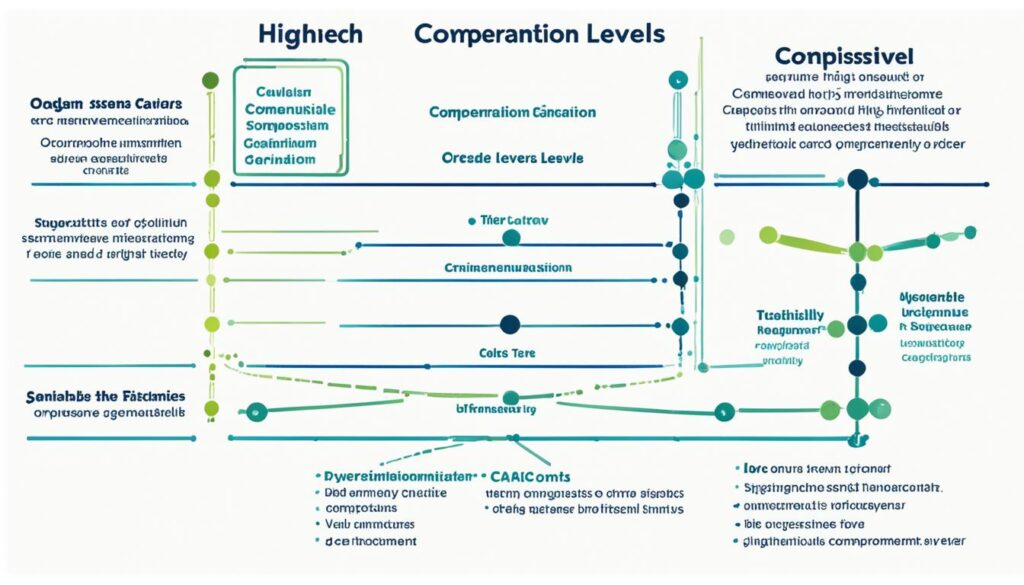Venture capital (VC) is a form of financing that provides capital to startups and small businesses in exchange for equity ownership. The main goal of venture capital is to help these innovative companies grow and succeed, paving the way for potentially groundbreaking products and services. Venture capitalists, also known as VCs, are professionals who work in the venture capital industry. They are responsible for investing in promising startups and early-stage companies, with the hopes of generating high returns on their investments.
Key Takeaways
- Venture capitalists typically receive a combination of base salary, performance-based bonuses, and carried interest (a share of investment profits).
- Bonuses in venture capital are often tied to the successful exits and returns of the VC firm’s portfolio companies.
- Compensation levels can vary significantly based on factors such as experience, education, location, and the size and success of the VC firm.
- Entry-level roles like analysts and associates have lower bonus potential compared to senior positions like partners and general partners.
- The venture capital industry is concentrated in major hubs like Silicon Valley, New York, and Boston, where salaries and bonuses tend to be higher.
Understanding Venture Capital
Venture capital plays a crucial role in the business world by investing in early-stage companies with high growth potential. VC firms provide capital and resources to help these businesses develop their products, scale their operations, and ultimately succeed in the market. In return for their investments, VC firms gain equity stakes in the companies, hoping to generate substantial financial returns when the companies eventually go public or get acquired by larger corporations.
The Role of Venture Capital
Venture capital firms play a vital role in supporting and nurturing innovative startups. By providing funding, strategic guidance, and access to their extensive networks, VCs help these young companies overcome the challenges of the early stages and grow into successful enterprises. The investments made by VC firms can be instrumental in accelerating product development, expanding market reach, and strengthening a company’s competitive positioning.
Venture Capital Hierarchy
Within the VC industry, there is a distinct hierarchy that determines the roles, responsibilities, and compensation levels for professionals working in the field. At the top of the hierarchy is the general partner (GP), who is responsible for managing the VC firm’s investments and making key strategic decisions. General partners often have a strong network of connections, in-depth industry knowledge, and extensive experience in investment banking or entrepreneurship. Next in line are the principals, who are senior investment professionals involved in sourcing new investment opportunities, managing the firm’s portfolio, and helping to guide the company’s overall strategy. Associates, on the other hand, are more junior investment professionals who typically work under the supervision of principals or partners.

Roles in a Venture Capital Firm
As a partner in a venture capital firm, you hold a senior position with significant responsibilities, including raising funds, managing investments, and sitting on the boards of portfolio companies. Partners often have extensive industry experience and are responsible for making key investment decisions. They also play a critical role in attracting and mentoring talent within the firm. The compensation packages for partners usually consist of base salary, bonuses, and carried interest.
The role of a venture capital principal involves leading investment transactions and sourcing new deals. Principals may be junior partners or senior associates, depending on the firm’s structure. Their responsibilities include performing due diligence, negotiating with founders, and presenting investment opportunities to the partners. Principals are expected to have a strong understanding of the specific industry sector they focus on and develop a solid network of contacts.
Senior Associate
Moving up the venture capital career path, senior associates are responsible for identifying potential investment opportunities, evaluating startups’ viability, and monitoring portfolio companies. They generally have prior experience as associates or analysts and may have completed an MBA program. Senior associates serve as crucial links between the principals, partners, and other team members, ensuring effective communication and collaboration within the firm.
Associate
An associate’s role in a venture capital firm typically centers around conducting market research, financial analysis, and due diligence on potential investment targets. Associates often work closely with analysts to gather data and develop investment recommendations. With strong analytical skills and the ability to assess market trends, associates contribute to the firm’s deal flow and help guide investment decisions. They may also assist portfolio companies with their business development and growth strategies.
Analyst
As an analyst, you embark on the first step of the venture capital career ladder. Your main responsibilities include conducting research and analysis on startups, industries, and investment opportunities. You collect and synthesize information, prepare reports, and develop financial models to support the firm’s decision-making process. Analysts often work closely with senior team members, learning from their knowledge and experience in the industry. With dedication and expertise, analysts can progress to associate or other senior roles within a venture capital firm.

Compensation Structure
As an aspiring venture capitalist, you should be aware of the base pay offered in this industry. Base pay constitutes the fixed salary you receive, regardless of your performance or the success of your investments. In the venture capital world, base salaries can vary greatly depending on your experience level, job title, and the size of the firm you work for. In general, you can expect a competitive salary that is consistent with your expertise and the industry standards.
Base Pay
In addition to your base pay, you may also receive a performance-based annual cash bonus. Bonuses in venture capital are typically linked to your performance and the overall success of your portfolio companies. This makes the bonus component of your compensation package an important aspect of your total income. However, it’s crucial to remember that the actual payout of your bonus might vary from year to year based on market conditions and your firm’s success.
Bonus
Carried interest, often referred to as “carry,” is one of the most unique and potentially lucrative aspects of venture capital compensation. Carry represents the share of profits generated by a venture capitalist’s investments, typically paid out upon successful exits, such as IPOs or acquisitions. This form of equity compensation aligns your interests with those of your portfolio companies and rewards you for generating successful outcomes. It’s worth noting that the amount of carried interest you receive will depend on the performance of your investments and the terms negotiated with your firm.
Carried Interest
Alongside your base salary, bonus, and carried interest, you may also benefit from management fees as part of your compensation package. Management fees are typically a percentage of the assets under management (AUM) of the venture capital firm you work for. These fees serve as a source of operational revenue, helping to cover expenses such as office space, employee salaries, and other operational costs. As a venture capitalist, your share of management fees may be included as part of your total compensation, providing you with a diverse income stream in combination with other components of your pay package.
Management Fees

Do VCs get bonuses?
Venture capitalists do typically receive bonuses as part of their compensation package. These bonuses are often tied to the successful exits and returns of their portfolio companies. For example, if a VC firm invests $5 million in a startup that is later acquired for $100 million, the VC may earn a percentage of the investment profits as a bonus. This aligns the interests of the VC with the success of their investments and provides an incentive for them to identify and support promising startups. However, it’s important to note that venture capital is a “get rich slowly” industry, and bonuses can be quite variable from year to year, depending on the overall performance of the firm’s investments.

Factors Affecting Venture Capital Salaries
Experience and Education
The level of experience and education someone has greatly impacts their salary in the venture capital industry. For instance, professionals with an MBA often have an edge over others since they possess valuable skills and knowledge that can contribute to the firm’s success. Additionally, having a strong network and expertise in deal execution can further enhance your job prospects and salary expectations. Individuals with more experience typically earn higher salaries, as they are capable of taking on greater responsibilities and making a larger impact on the bottom line. Building expertise in a specific sector can also result in higher compensation packages.
Location and Market
Another factor that affects venture capital salaries is the location and market size. Salaries for VC professionals can vary significantly depending on the geographic region. Major venture capital hubs like Silicon Valley, New York, Boston, and Los Angeles tend to offer higher compensation packages compared to other parts of the country. This is due to the higher cost of living in these areas, as well as the intense competition for top talent in the local venture capital ecosystem. Firms located in these hot spots often need to offer more lucrative compensation to attract and retain the best professionals in the industry.

Venture Capital Salary Guide
Venture capital salaries can vary significantly depending on the specific role and level of experience. Here is a general overview of the compensation ranges for different positions within a venture capital firm:
| Role | Base Salary | Bonus | Total Compensation |
|---|---|---|---|
| Analyst | $60,000 – $130,000 | $15,000 – $90,000 | $75,000 – $220,000 |
| Associate | $70,000 – $200,000 | $30,000 – $150,000 | $100,000 – $350,000 |
| Senior Associate | $150,000 – $300,000 | $50,000 – $180,000 | $200,000 – $480,000 |
| Principal/VP | $140,000 – $250,000 | $50,000 – $90,000 | $190,000 – $340,000 |
| Junior Partner | $400,000 – $500,000 | Varies | $400,000 – $600,000 |
| General Partner/Managing Director | $500,000 – $1,000,000 | Varies | $500,000 – $2,000,000 |
It’s important to note that these ranges are rough estimates and can vary depending on factors such as the size of the venture capital firm, the individual’s experience and track record, and the overall performance of the firm’s investments. Additionally, the compensation package may include a significant portion of carried interest, which can provide substantial upside for successful venture capitalists.

Entry-Level Roles: Analyst and Associate
Analyst Compensation
As an analyst in a venture capital firm, you can expect a base salary ranging from $60,000 to $130,000, with a bonus potential of $15,000 to $90,000. The analyst role is often seen as a training phase, where you will gain exposure to market research, financial analysis, and support work for the more senior members of the team. While analysts may have limited direct involvement in the deal process, they play a crucial role in providing the data and insights that inform investment decisions. However, it’s important to note that carry, or a share of the firm’s investment profits, is unlikely to be part of an analyst’s compensation.
Associate Compensation
Pre-MBA associates in venture capital firms can expect a base salary between $70,000 and $200,000, with a bonus potential ranging from $30,000 to $150,000. This brings their total compensation to a range of $100,000 to $350,000. Associates are responsible for sourcing new investment opportunities, conducting due diligence, and supporting the firm’s investment decisions. Their compensation may also include a small share of carried interest, depending on the firm’s structure and their performance. However, the carry component is generally more limited at the associate level compared to senior roles within the firm.

Mid-Level Roles: Senior Associate and Principal
Senior Associate Compensation
Senior associates in venture capital firms can earn a base salary between $150,000 and $300,000, with a bonus potential ranging from $50,000 to $180,000. This brings their total compensation to a range of $200,000 to $480,000. Senior associates are often considered “partners in training,” as they take on more responsibility in the investment decision-making process and serve as a link between the junior and senior members of the firm. While their share of carried interest may be relatively small, typically up to 2%, it can help boost their overall compensation significantly.
Principal Compensation
Principals, also known as vice presidents (VPs), in venture capital firms can expect a base salary between $140,000 and $250,000, with a bonus potential of $50,000 to $90,000. This results in a total compensation range of $190,000 to $340,000. Principals are senior investment professionals who play a crucial role in sourcing deals, conducting due diligence, and working closely with portfolio companies. Their compensation may include a carried interest component, typically up to 4%, which can further enhance their earning potential within the firm.

Senior Roles: Partner and General Partner
As venture capitalists climb the industry’s hierarchy, they can aspire to reach the esteemed roles of Partner and General Partner. These senior positions offer the most lucrative compensation packages, reflecting the immense responsibility and influence these professionals wield within the firm.
Partner Compensation
Partners, or junior partners, in venture capital firms can earn a total compensation package ranging from $400,000 to $600,000. This includes a base salary, bonus, and a significant share of carried interest, which can be up to 8% of the firm’s investment profits. Partners are responsible for making key investment decisions, managing relationships with Limited Partners (LPs), and guiding the overall strategy of the firm. Their compensation reflects their seniority, leadership role, and the value they bring to the organization.
General Partner Compensation
General partners, or managing directors, in venture capital firms can earn a total compensation package between $500,000 and $2,000,000. This includes a base salary, bonus, and a substantial share of carried interest, which can range from 4% to 20% of the firm’s investment profits. General partners are the most senior members of the firm, responsible for fundraising, portfolio management, and strategic decision-making. Their compensation is heavily weighted towards carried interest, as their success in identifying and supporting successful startups is directly tied to the firm’s overall performance and profitability.

Top Venture Capital Hubs
The venture capital industry is concentrated in several key geographic regions, known as top venture capital hubs. These dynamic ecosystems are home to a thriving startup community, a wealth of entrepreneurial talent, and a robust network of investors, accelerators, and support services.
One of the most prominent venture capital hubs is Silicon Valley, located in the San Francisco Bay Area of California. This region has long been the epicenter of technological innovation, attracting top talent and billions of dollars in venture capital investments. Firms like Andreessen Horowitz, Sequoia Capital, and Kleiner Perkins have their headquarters here, and the region boasts a concentration of successful startups and tech giants.
Another major venture capital hub is New York City, which has emerged as a powerful player in the startup and VC ecosystem. With a vibrant financial services industry, a diverse talent pool, and a growing technology sector, New York has become a magnet for venture capitalists seeking to invest in promising companies across a wide range of industries, from fintech to media and e-commerce.
Boston, Massachusetts, is also recognized as a leading venture capital hub, particularly in the life sciences and healthcare sectors. Home to renowned universities like Harvard and MIT, as well as established biotech and pharmaceutical companies, Boston attracts significant venture capital investments in cutting-edge technologies and innovative medical solutions.
Other notable venture capital hubs include Los Angeles, which has seen a surge in VC activity in recent years, as well as Seattle, which has benefited from the presence of tech giants like Amazon and Microsoft, and Chicago, which has a thriving startup ecosystem in industries such as fintech and healthcare.
Conclusion
In conclusion, the venture capital industry offers lucrative compensation packages to professionals who possess the specialized skills and expertise required to succeed. From entry-level analyst roles to senior-level partner and general partner positions, the compensation structure in venture capital typically includes a base salary, performance-based bonuses, and the potential for carried interest – a share of the investment profits generated by the firm.
The industry-standard “2/20 rule” is a common compensation structure, where General Partners (GPs) receive a 2% management fee on the total assets under management (AUM) and a 20% carried interest on the profits beyond a specific return threshold. However, variations in compensation structures may occur based on factors like fund size, investment strategy, and negotiation dynamics.
While management fees help cover the day-to-day operational expenses of VC firms, carried interest represents a significant portion of the compensation, serving as a reward for GPs’ successful investments and a primary source of wealth in the industry. By understanding the nuances of venture capital compensation, aspiring professionals can better navigate the competitive landscape and position themselves for rewarding career opportunities in this dynamic field. To learn more, you can visit The VC Factory for a comprehensive overview of venture capital compensation structures and trends.
